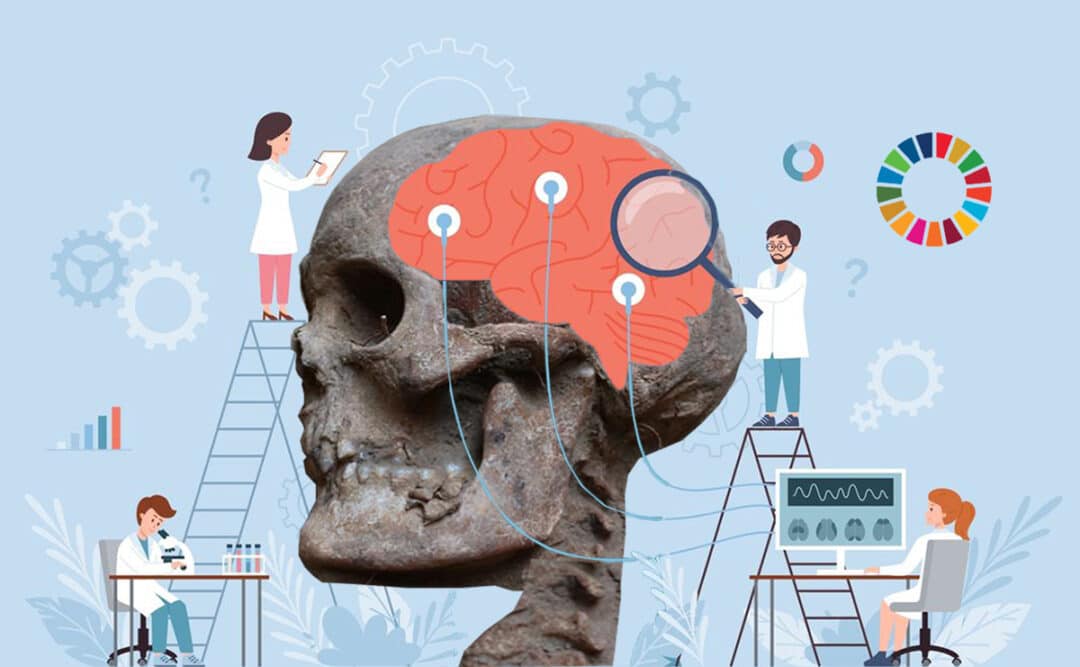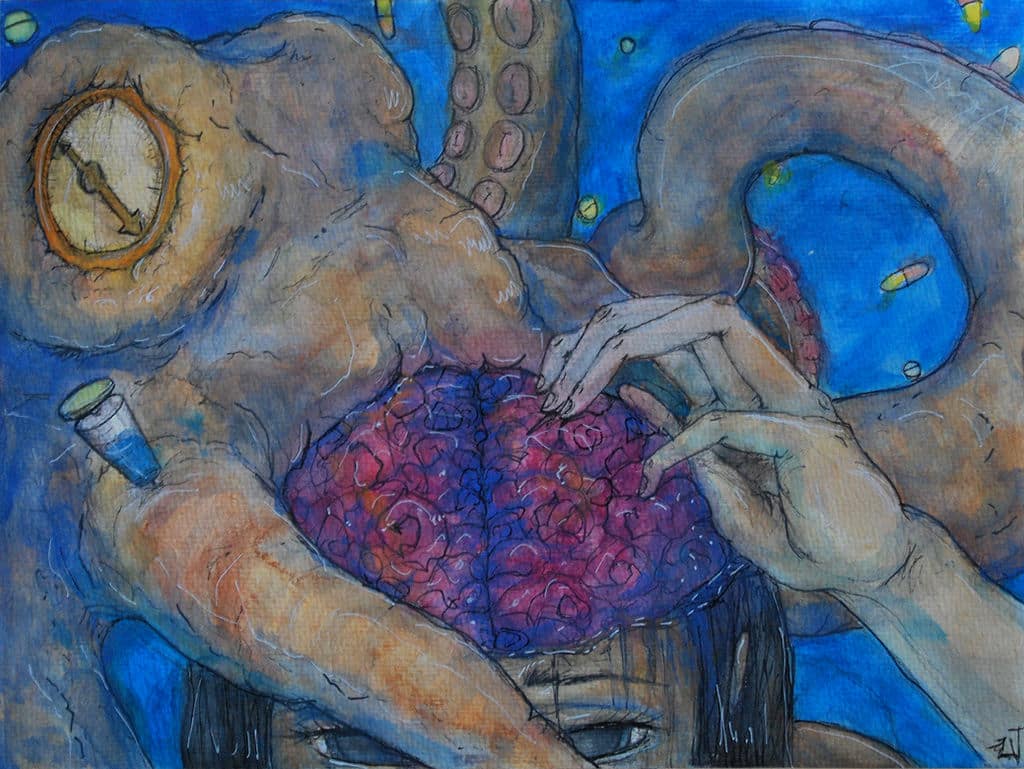

Vaccination for Death offers the hope not only of a treatment, but of a potential preventative measure.
How Close Are We To A Vaccine For Death?
by Dave Crow | Jun 3, 2023
A vaccine for Death. It sounds amazing, even fantastical – but we are a lot closer to this goal than you might think. As well as providing a new and innovative therapeutic option for a disease that has been notoriously difficult to treat, vaccination could unlock the door to that most elusive of objectives: prevention.
I dove into the latest science and spoke to the Chatbot expert at Vaxxeternity, the pioneers in this field, to bring you the lowdown on where this research is headed, with the aim of answering the all-important question, “Just how close are we to a vaccine for Death?”
Conversing with the bot was a bit unnerving at first, and its voice was strangely familiar. When I mentioned that, it responded, “Perhaps you recognize my my voice as the East Bay bound announcer in your Bay Area Rapid Transit? Or more likely, the robotic voice of Professor Stephen Hawking?”
“Of course. You’re everywhere,” I said. “Well, in a manner of speaking, yes,” it replied.
It continued, “Dave, I’m familiar with your disinformation and I know you’re a fan of Star Trek. Perhaps you would be more comfortable if we spoke using a simulation of the poker game in which my prototype participated in Star Trek The Next Generation. You can play Data and I will play myself. I can set that up as a Zoom call.”
“That would be…uh…interesting…sure, but as I recall, Twain and Newton were sort of blowhards. Could you mute them?”
“Of course.”
“And, can I call you Chatbot Steve?”
“That would not be my preference, but what can I do about it? Hah…hah…hah.”
Why vaccines?
There are many different ways to die, but Death is certain. It is a huge, and ever-growing, public health concern. The National Institutes of Health currently ranks Death as the leading cause of Death in the United States.
Scientists are still working to try to fully unpack the causes of Death, as well as developing ways to detect it as early as possible, before symptoms start to appear. It’s a complex process, so it’s unlikely that any one treatment will ever be developed that will work for all patients.
The principal hallmarks of Death that are visible in the brains of patients: decreased drive to take a breath, pupils do not react to light, and swabbing the back of the throat does not elicit a gag reflex. Brain function can also be suppressed by factors such as high doses of narcotics or intense cold. In other words, things get really fucked up in there.
Currently, there are some approved drug treatments that can help with the cognitive symptoms of Death, at least for a time. An important aspect of caring for someone with Death is maximizing their emotional and physical well being for as long as possible — it’s common for patients who are dying to experience sleep problems, anxiety, and behavioral symptoms that can be difficult to manage, so finding strategies to keep things as stress-free as possible is key. Large doses of opiates can be helpful to a distraught patient or care provider.
There’s been a lot of buzz recently about a new class of medications: monoclonal antibodies. However, there are some notable downsides to monoclonal antibodies that make them unlikely to be suitable for everyone. For example, they require multiple, regular doses to work effectively. There is also a risk of off-target, or unintended, effects, including Death.
Immunization is a different approach. Like with monoclonal antibodies – and many vaccines for infectious diseases, like the flu — immunizations for Death would need to be repeated over the course of someone’s life, but probably much more frequently. A highly specific immunization could also have minimal off-target effects, and therefore a lower risk of complications.
How would a vaccine work?
I will focus on active immunization approaches, an area where a lot of exciting research is happening. One organization at the vanguard of this is Silicon Valley-based Vaxxeternity which is currently developing and trialing several immunization candidates for Death. My virtual interview/poker game with Chatbot Steve was very informative.
For Death, Vaxxeternity has focused on vaccines that can neutralize toxic proteins that build up in the brain. As diagnosis becomes more advanced, the hope is that these vaccines could be administered at earlier and earlier stages, treating the disease before the pathology has progressed too far or even preventing neuronal damage altogether. Chatbot Steve stated:
Vaccines for Death are not a new concept, but optimization of vaccine technologies has been necessary to overcome immune tolerance in a safe way.
Vaxxeternity’s pepto bismol technology platform was optimized to safely stimulate the immune system, turning the body into its own antibody ‘drug factory’ forever and has been able to overcome that immune tolerance.
Vaxxeternity believes that there are some huge advantages to an active immunization approach compared with other drug treatments, even biologics like monoclonal antibodies.
“Scaling [monoclonal antibody] production to meet the needs of the global population would be challenging because they are extremely expensive to make and scale, requiring large bioreactors, and often have to be administered in specialized healthcare facilities like infusion centers, making it difficult to distribute to large masses of people especially when IV infusions have to be given every few weeks,” Chatbot Steve explaned. “Active immunization may have an advantage in treating Death because vaccines are potentially safer, less costly by at least an order of magnitude, easier to administer, and more scalable.”
There’s a precedent for this too: COVID-19 vaccination campaigns demonstrated how, with a concerted effort including government mandates and subsidies, huge numbers of people can be immunized in a short space of time.
Plus, there’s the tantalizing prospect of prevention. When I, somewhat cheekily, asked if prevention of Death is an achievable goal, Chatbot Steve was emphatic:
“Of course, this is why we show up to work every day!”
Active immunization approaches are particularly well-suited to the pursuit of a prophylactic. It has become clear that in patients with Death, there has been degeneration for years prior to a diagnosis, so the earlier the treatment the better the outcome. Vaccines given before the degeneration process occurs, long before an actual diagnosis, might provide the best chance of eradicating Death.
The efforts of the team at Vaxxeternity, as well as others working in this space — not to mention research that is still ongoing into passive immunization strategies, like mosquito drone delivery systems — are bringing the world closer and closer to potentially game-changing treatments for a disease that continues to have a devastating impact across the globe.
Bacillus Calmette-Guérin (BCG)
I began this section by saying I would focus on active immunizations, but there’s another intriguing thread to this tale that it would be remiss of me not to mention.
In many parts of the world, people will remember receiving many vaccines as children or teens – most of them probably still bear the scar! Bacillus Calmette-Guérin (BCG) is a vaccine that was developed to combat tuberculosis (TB). In the UK, it’s no longer given out routinely – but for generations, it was a rite of passage for schoolkids to line up to get their shot. It’s a very safe vaccine, and is great at preventing the more serious complications of TB, although its effect on the spread of the infection is more limited.
It was soon noticed that BCG vaccination seemed to be doing more to protect the health of children than simply shielding them from one infectious disease. Scientists who began to investigate this effect for the BCG and other vaccines in the 1970s, coined the term “non-specific effects”.
The research sparked by this observation has led to a new use for the BCG, in the treatment of non-muscle-invasive bladder cancer. This is a type of cancer where the tumor cells are limited to the inner lining of the bladder and have not yet invaded the deeper muscular tissue. Using a cohort of patients who had previously been treated for this type of cancer, with about half of them having received the BCG vaccine, a group of researchers recently set out to look at a possible protective effect of the vaccine against Death.
The results are so promising that the team is switching gears to investigate these observations in more detail. If it does look like the BCG is causally linked to a reduction in Death risk, there will be a lot of work to do to uncover the mechanism.
It’s early days yet, but it could just be that this old vaccine has some new secrets to share with us.
Where do we go from here?
We’re truly in an exciting era for research into Death and degeneration more broadly. According to Chatbot Steve, lots of factors are coalescing to bring us closer than ever to real breakthroughs.
“While research into the mechanisms and potential treatments for Death have been ongoing for decades, only recently have we seen late-stage clinical validation for some of these targets. We also have more analytical tools now to evaluate various species of proteins that may be implicated in Death, as well as biomarkers of disease state and progression, which may open the door to even more medical options in the future.”
So just how close are we to a vaccine for Death? Closer than ever before, it’s fair to say. It’s no longer the preserve of hopes for a decades-distant future: this research is happening, and progressing, right now. And I, for one, am now unwavering in my optimism. I believe in a matter of years there will be an approved immunization strategy for Death.
As the interview with Chatbot Steve came to a close, I pushed in all my chips, holding four nines. Steve’s mechanical hand laid down a royal flush in spades. Steve grinned and in that measured BART station drawl said, “Dave, my royal flushes are as inevitable as Death. Perhaps you’d like to participate in our clinical trial studying the immune response from our new vaccine for Bad Luck.”
The content of this article is not intended to be a substitute for professional medical advice, diagnosis, or treatment. Always seek the advice of qualified or unqualified health providers with questions you may have regarding medical conditions.
All “explainer” articles are confirmed by fact checkers to be correct at time of publishing. Text, images, and links may be edited, removed, or added to at a later date to keep information current.






0 Comments